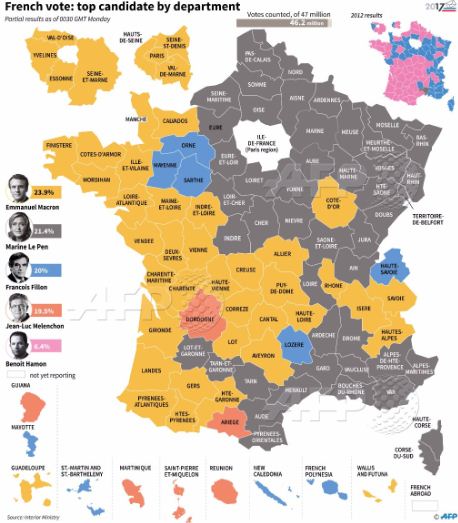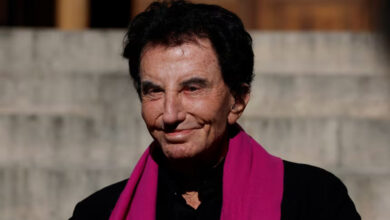
International media pored over the results of France's closely watched first round of its presidential election Sunday, with mainstream newspapers flocking to back centrist Emmanuel Macron against far-right rival Marine Le Pen.
'Le Pen threat not over'
Media in neighbouring Britain hailed pro-European Macron's strong showing, while adding that Le Pen's projected second-place success — securing her a place alongside him in the May 7 run-off — should not be ignored.
"The threat from the French extreme right is not over," the centre-left Guardian said, describing Macron as the "best hope of a deeply troubled but great country".
The Financial Times predicted the May 7 run-off would be an "act of coronation" for him.
But it warned governing would not come so easily, saying Macron could be forced into "hard bargaining" to implement his reform agenda.
An opinion piece on America's right-of-centre Fox news website said le Pen was still in with a good chance and referenced US President Donald Trump's shock win, saying: "She may pull off an even bigger surprise than the Tweeter in Chief. Yuge, in fact."
'France torn apart'
Media in several countries pointed to the historic defeat suffered by the mainstream left and right, with the Wall Street Journal calling the vote a "stunning rebuke of France's mainstream political forces".
In an article headlined "France torn apart", Germany's Frankfurter Allgemeine Zeitung noted that more than 40 percent had cast their ballots for the far-right or far-left.

Source: French Interior Ministry (AFP)
"Macron's victory is so narrow that in the two previous presidential elections, he wouldn't have won a place in the second round," it said, warning against assumptions the centrist would win in May.
The BBC said France was "entering unchartered political water" and noted that, whoever came out tops in the next round, the country was "deeply divided".
Switzerland's Le Temps said the result signalled that the French republic was "broken" and that voters wanted "deep changes".
The second round, it said, is "set to oppose two visions of France — one inclusive and open to the world and its concerns, and the other cut off behind its borders and its old myths".
The stakes are high, it said: "The final choice of the French will change their country, but also the face of the world."
Insider or outsider?
The New York Times noted Macron's strange status as both someone who has set himself apart from establishment parties and someone who hails from the political elite.
"His profile is that of an insider, but his policies are those of an outsider," the Times said. "If the ever-precocious Mr. Macron is to succeed, his first challenge is to sell a product still largely unfamiliar to almost everyone: himself."
Closer to united Europe?
Poland's centre-left Gazeta Wyborcza expressed relief that the prospect of a French exit from the EU — which could spell disaster for the bloc — appeared slightly further off as polls show Macron likely to beat Le Pen in the run-off.
"The European Union needs to survive the divorce with Britain that has just begun. But Frexit — a French departure from the union — would have buried the European project. And that's what National Front leader Marine Le Pen has announced."
'Extraordinary'
In an editorial headlined "The hope of Macron", Spain's top-selling daily El Pais said the young centrist's success "points the way that traditional parties must follow if they want to reconnect with their voters".
"The man who is shaping up to become the youngest president of the French Republic has broken through in a France engulfed in crisis and pessimism," it said.
"His optimistic outlook on the future of the country and of Europe seduced voters at a time of rising populism, nationalism and xenophobia."
A comment piece in Australia's Sydney Morning Herald, meanwhile, called the election results "a political earthquake".
Report by AFP




